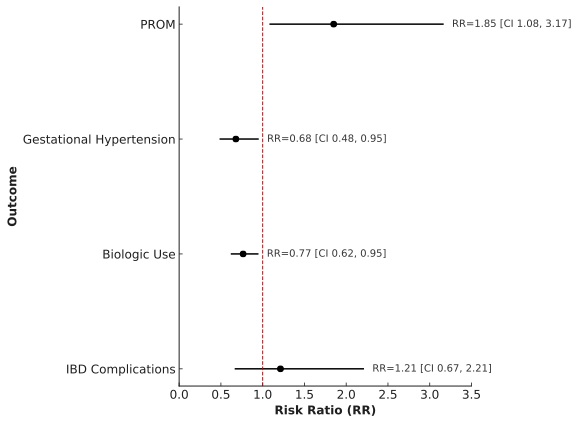Sunday Poster Session
Category: IBD
P1099 - Racial Disparities in Pregnancy Outcomes Among Women With Inflammatory Bowel Disease
Sunday, October 26, 2025
3:30 PM - 7:00 PM PDT
Location: Exhibit Hall

Jordan Barnett-Kradjian, DO
Stony Brook Medicine
Stony Brook, NY
Presenting Author(s)
Jordan Barnett-Kradjian, DO1, Jacky Reny, MD2, Kaustav Patra, MD2, Rahul Tripathi, MD1
1Stony Brook Medicine, Stony Brook, NY; 2Stony Brook University Hospital, Port Jefferson Station, NY
Introduction: Women with inflammatory bowel disease (IBD) are at increased risk for adverse pregnancy outcomes. Minority populations also face worse general obstetric outcomes. We aimed to compare risks of adverse pregnancy outcomes between racial cohorts with IBD.
Methods: We conducted a retrospective cohort study across 147 healthcare organizations using the TriNetX database. Women aged 15–45 years from 2010–2024 who were diagnosed with pregnancy, and Crohn’s disease or ulcerative colitis were included. Exclusions were pregestational diabetes, systemic lupus erythematosus, and multiple gestations. Patients were divided into White and Hispanic cohorts. Propensity score matching (1:1) was performed for age, BMI, primary hypertension, smoking, maternal comorbidities, and surgical history. Outcomes within nine months of pregnancy included premature rupture of membranes (PROM), gestational hypertension, biologic use, and IBD complications (ulcers, abscesses, or fistulas). Patients with prior IBD complications were excluded. Risk was reported as risk ratios (RR) with 95% confidence intervals (CIs).
Results: After matching, 2,204 women were included, with a mean age of 30.45 years. Hispanic women had a significantly higher risk for PROM compared to White women (RR 1.850, CI 1.081–3.167), and a lower risk of gestational hypertension (RR 0.679, CI 0.484–0.953). They were also less likely to receive biologic therapy (RR 0.766, CI 0.618–0.950). Rates of IBD complications were higher among Hispanic women, though not statistically significant (RR 1.213, CI 0.665–2.213).
Discussion: Hispanic women with IBD face increased risk of PROM and lower risk of gestational hypertension, highlighting the complexity of pregnancy outcomes across racial groups. These differences may reflect true physiological variation, underdiagnosis, or variations in care-seeking behaviors. Biologic use was significantly lower among Hispanic women, suggesting potential barriers to treatment access. Although IBD complications were not significantly different, higher observed rates in Hispanic women warrant further study. These findings underscore the need for equitable, individualized IBD care during pregnancy and call for research into systemic factors contributing to these disparities.

Figure: Risk of pregnancy outcomes in Hispanic women compared to White women with IBD

Figure: Total number of women included in risk analysis after PSM
Disclosures:
Jordan Barnett-Kradjian indicated no relevant financial relationships.
Jacky Reny indicated no relevant financial relationships.
Kaustav Patra indicated no relevant financial relationships.
Rahul Tripathi indicated no relevant financial relationships.
Jordan Barnett-Kradjian, DO1, Jacky Reny, MD2, Kaustav Patra, MD2, Rahul Tripathi, MD1. P1099 - Racial Disparities in Pregnancy Outcomes Among Women With Inflammatory Bowel Disease, ACG 2025 Annual Scientific Meeting Abstracts. Phoenix, AZ: American College of Gastroenterology.
1Stony Brook Medicine, Stony Brook, NY; 2Stony Brook University Hospital, Port Jefferson Station, NY
Introduction: Women with inflammatory bowel disease (IBD) are at increased risk for adverse pregnancy outcomes. Minority populations also face worse general obstetric outcomes. We aimed to compare risks of adverse pregnancy outcomes between racial cohorts with IBD.
Methods: We conducted a retrospective cohort study across 147 healthcare organizations using the TriNetX database. Women aged 15–45 years from 2010–2024 who were diagnosed with pregnancy, and Crohn’s disease or ulcerative colitis were included. Exclusions were pregestational diabetes, systemic lupus erythematosus, and multiple gestations. Patients were divided into White and Hispanic cohorts. Propensity score matching (1:1) was performed for age, BMI, primary hypertension, smoking, maternal comorbidities, and surgical history. Outcomes within nine months of pregnancy included premature rupture of membranes (PROM), gestational hypertension, biologic use, and IBD complications (ulcers, abscesses, or fistulas). Patients with prior IBD complications were excluded. Risk was reported as risk ratios (RR) with 95% confidence intervals (CIs).
Results: After matching, 2,204 women were included, with a mean age of 30.45 years. Hispanic women had a significantly higher risk for PROM compared to White women (RR 1.850, CI 1.081–3.167), and a lower risk of gestational hypertension (RR 0.679, CI 0.484–0.953). They were also less likely to receive biologic therapy (RR 0.766, CI 0.618–0.950). Rates of IBD complications were higher among Hispanic women, though not statistically significant (RR 1.213, CI 0.665–2.213).
Discussion: Hispanic women with IBD face increased risk of PROM and lower risk of gestational hypertension, highlighting the complexity of pregnancy outcomes across racial groups. These differences may reflect true physiological variation, underdiagnosis, or variations in care-seeking behaviors. Biologic use was significantly lower among Hispanic women, suggesting potential barriers to treatment access. Although IBD complications were not significantly different, higher observed rates in Hispanic women warrant further study. These findings underscore the need for equitable, individualized IBD care during pregnancy and call for research into systemic factors contributing to these disparities.

Figure: Risk of pregnancy outcomes in Hispanic women compared to White women with IBD

Figure: Total number of women included in risk analysis after PSM
Disclosures:
Jordan Barnett-Kradjian indicated no relevant financial relationships.
Jacky Reny indicated no relevant financial relationships.
Kaustav Patra indicated no relevant financial relationships.
Rahul Tripathi indicated no relevant financial relationships.
Jordan Barnett-Kradjian, DO1, Jacky Reny, MD2, Kaustav Patra, MD2, Rahul Tripathi, MD1. P1099 - Racial Disparities in Pregnancy Outcomes Among Women With Inflammatory Bowel Disease, ACG 2025 Annual Scientific Meeting Abstracts. Phoenix, AZ: American College of Gastroenterology.

